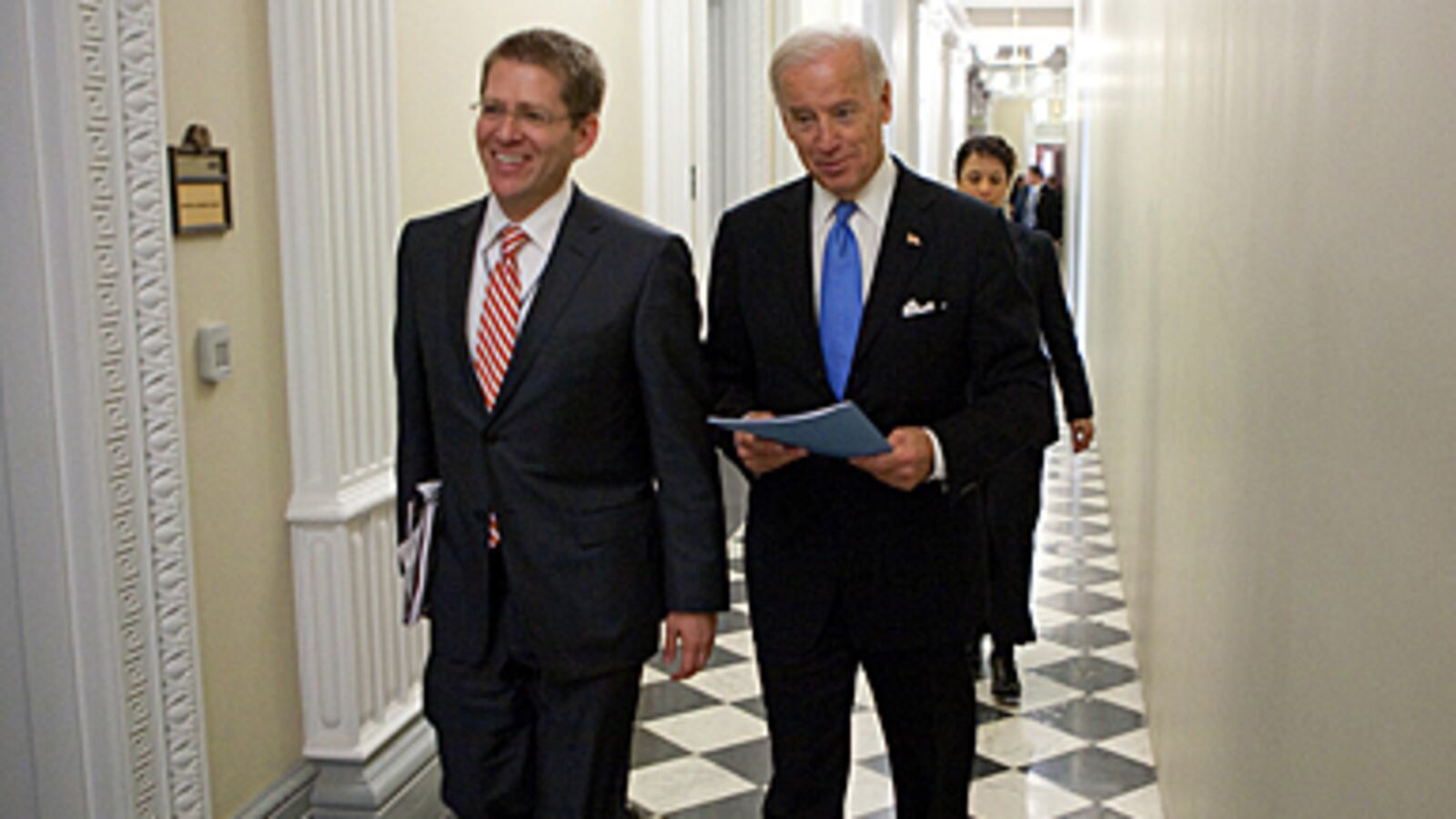When Jay Carney takes over from Robert Gibbs as President Obama’s chief spokesman this month, it might become a case of “be careful what you wish for” for White House beat reporters.
Carney certainly has friends in the press room—but does he have clout in the West Wing?

Time magazine’s former Washington bureau chief, 45, spent two decades as a journalist before joining the administration two years ago as Vice President Biden’s communications director, and is expected to be far more responsive to the needs of his erstwhile colleagues than the sometimes flippant Gibbs. The 39-year-old Gibbs, a trusted Obama confidant since the latter’s 2004 Senate race, has experienced occasionally tense relations with press room regulars and is notorious for not returning phone calls.
Carney is a champ at returning phone calls.
But he’s not an Obama insider—hardly an advantage when toiling for an insular politician who is naturally wary of newcomers and relies on a tight circle of advisers and intimates. Some White House veterans, including at least one former presidential press secretary, worry that Carney won’t receive the necessary access to Obama, and other policymakers at key meetings, to speak from the podium with the authority that Gibbs unquestionably enjoyed.
Ron Nessen, who left his position as NBC News’ White House correspondent to serve as Gerald Ford’s press secretary from 1974 to 1977, warned that a recent Washington Post story indicates that Carney will be twice removed from the president in the West Wing chain of command—reporting to White House communications director Dan Pfeiffer, who in turn reports to senior presidential adviser David Plouffe.
“If the press secretary is not reporting directly to the president, his boss, I think it’s going to be a disaster,” Nessen told me, adding that he made sure to meet with Ford every day at 11 a.m. for half an hour before briefing the press. “How can you accurately reflect the president’s thinking if you have to go through two layers? That was one of the conditions I made with Ford when I took the job—that I would have direct access to him, and that I could attend any meeting I wanted.”
ABC News’ longtime White House correspondent Ann Compton, who has been covering presidents since Ford, seconded Nessen’s concerns.
“If the press secretary is not reporting directly to the president, his boss, I think it’s going to be a disaster,” Nessen told me.
“I became suspicious when the president didn’t announce [Carney’s elevation]; Bill Daley did,” Compton told me, referring to the new chief of staff. “When Tony Snow came on, Bush announced it. When Scott McClellan left, Bush announced it. I think this time, it was stunning, and it was stunningly clear when the president did not make this announcement that the new press secretary will not be duplicating what Robert Gibbs has done for the past two years.”
Echoing Nessen’s caveat about bureaucratic layering, Compton added: “What I fear is that when the press secretary comes out to brief, he is two steps removed from somebody who has been in the Oval Office. David Plouffe is the one who has been in all the meetings. I am concerned about any press secretary who is that far removed from the policy debates. That press secretary will inevitably end up doing more talking points… Presumably Jay will be accessible. He emailed me very quickly when I wrote him about his appointment. My concern is, where is his firsthand knowledge coming from?”
NBC News White House correspondent Chuck Todd, who co-hosts The Daily Rundown on MSNBC, told me he has raised the same issues with senior White House staffers and shares similar concerns.
Carney declined to be interviewed for this story. But Pfeiffer, his nominal superior, sent me a detailed and effusive email praising Gibbs’ successor and promising that he’ll get whatever access he needs.
Noting that Carney will have “assistant to the president” rank, the top designation for a White House staffer, Pfeiffer wrote: “He was promised the access by Daley and Plouffe when he was offered the job. They and the president are committed to ensuring that Jay has everything he needs to succeed in this job. Just like Gibbs, Jay can walk into the Oval whenever he needs to. There is only one Robert Gibbs, in terms of his relationship with the president, but Jay has built strong ties with the president and his team over the last two years and he will bring a powerful intellect, a unique set of experiences, and real stature to the job. I am 100 percent confident that Jay will end up being one of the strongest people to ever stand behind that podium.”
As for the press secretary’s downgraded status in the chain of command, Pfeiffer argued: “The restructuring of the communications and press department was designed to revamp a structure that was set up before cable TV and the Internet were invented, and bring it more in line with the media of today. In the new setup, the press office will be enhanced with more staff and management responsibilities.” He added: "I view Jay and I as partners in this endeavor and we will operate as such."
CBS News White House correspondent Bill Plante, for one, told me the new structure “probably makes sense.” He added that Carney “comes recommended by Biden, and the White House told us he was interviewed personally by Obama for the job. He’ll have as much access as they want to give him.”
Plante, who has been covering presidents since Lyndon Johnson, said that even if Carney doesn’t receive Gibbs-like access, it doesn’t matter that much. “They’re going to tell us what they want to tell us, just like they do now.”
A negative outcome for Carney, of course, would be that he’ll become Obama’s answer to Scott McClellan, who at the Bush White House was excluded from key meetings, denied crucial information, particularly by Karl Rove and Scooter Libby about their role in leaking the identity of CIA agent Valerie Plame, and later penned a bitter memoir complaining that he was lied to.
But the worst-case scenario—given official Washington’s obsession with the perquisites of power—would be if Carney wasn’t given the traditional spacious press secretary’s office that has been occupied by Gibbs and most of his recent predecessors.
“I have not been told otherwise,” Gibbs dodged at Monday’s briefing under a grilling by ABC’s Compton.
That answer sounded like a definite-maybe-no. Luckily, Carney secured better assurances.
"Jay will get Gibbs' office," Pfeiffer emailed late in the day.
Lloyd Grove is editor at large for The Daily Beast. He is also a frequent contributor to New York magazine and was a contributing editor for Condé Nast Portfolio. He wrote a gossip column for the New York Daily News from 2003 to 2006. Prior to that, he wrote the Reliable Source column for the Washington Post, where he spent 23 years covering politics, the media, and other subjects.






